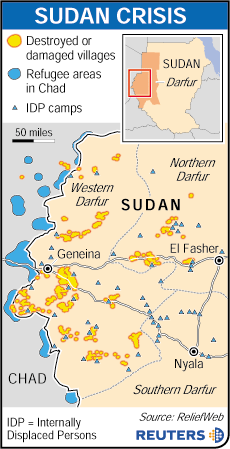Darfur main rebel groups agree to talks in Sudan
NEW YORK, July 23, 2004 (dpa/UN News Centre) — Sudan’s two main rebel groups in the Darfur crisis have agreed to hold substantive political talks with the government in Khartoum, a U.N. spokesman said Friday, while U.S. lawmakers called the atrocities “genocide” and a U.N. official said up to 15 children die each day at a refugee camp in the south of the country.
 The breakthrough follows a day of talks in Geneva with officials from the African Union (AU) and the United Nations, including Mohamed Sahnoun, the Secretary-General’s Special Adviser on Africa, according to a UN spokesman.
The breakthrough follows a day of talks in Geneva with officials from the African Union (AU) and the United Nations, including Mohamed Sahnoun, the Secretary-General’s Special Adviser on Africa, according to a UN spokesman.
AU and UN officials will now discuss with the Sudanese Government exactly where and when substantive talks can take place between Khartoum and the leaders of the Sudan People’s Liberation Movement (SPLM) and the Justice and Equality Movement (JEM).
Fred Eckhard said at U.N. headquarters in New York that the Sudan Liberation Army (SLA) and the Justice and Equality Movement (JEM) met in Geneva with a U.N. delegation headed by Mohammed Sahnoun, the special envoy in Africa for Secretary General Kofi Annan.
Eckhard said the rebel groups, Sahnoun and Khartoum will discuss the venue and date for the substantive talks.
Both SLA and JEM have been fighting the Khartoum-backed Arab militias known as Janjaweed in Sudan’s Darfur region where the U.N. said the Janjaweed committed serious human rights violations.
SLA and JEM began the talks early July in Addis Ababa, but they broke down when they insisted on preconditions for the political negotiations. The talks resumed in Geneva under U.N. mediation.
In New York, legal experts in the U.N. Security Council met to try to complete a draft resolution that would ask the council to impose an arms embargo and a travel ban on the Janjaweed unless the humanitarian crisis in Darfur is brought to an end.
Up to 15 children die on a daily basis at the Mornei refugee camp in southern Sudan, a German UNICEF goodwill ambassador said Friday.
Dysentery and malaria along with malnutrition are the prime causes of death in the camp, where some 90,000 refugees have fled fighting between rival forces in the Darfur region, said UNICEF ambassador Steffen Seibert.
“It is a deadly cycle of diarrhea, dehydration and death,” he said.
Approximately 1.2 million refugees have been directly affected by fighting that has raged in Darfur for the past year. In addition, over 100,000 people have fled to neighbouring Chad, where UNICEF is also providing emergency assistance.
Hundreds of villages have been burned, crops and livestock looted or destroyed, and food reserves and coping mechanisms eroded.
This devastation has occurred in a region already under-served in terms of health, water, sanitation and education services. These services are now completely over-stretched and unable to provide adequate assistance to the IDPs and neighbouring villages.
Consequently, children and women are left extremely vulnerable to epidemic diseases, which are likely to increase as a result of the upcoming rainy season, and malnutrition has reached alarming rates among children under five.
The bodies of two Darfur refugees – a man and a woman – were found by aid workers in a camp in Chad on Thursday, the United Nations refugee organization UNHCR announced Friday in Geneva.
Prior to the deaths, humanitarian workers had alerted authorities about attacks in two camps in Chad and had searched for weapons in an effort to determine who was responsible. Seventeen had been arrested in connection with the disturbances.
U.S. President George W. Bush on Friday called for the Sudanese government to quell the continuing violence in the Darfur region.
It was his first comment after the U.S. Congress used the strongest terms to condemn reported atrocities by Janjaweed militias against tribes in western Sudan, but Bush stopped short of calling the Darfur conflict genocide.
The U.S. Senate and House of Representatives each unanimously passed resolutions late Thursday declaring that the Darfur atrocities are genocide.
Both chambers accused the Sudanese government of violating the 1948 Convention on the Prevention and Punishment of the Crime of Genocide.
The Senate deplored “the failure of the United Nations Human Rights Commission to take appropriate action”, with respect to the crisis in Darfur”. The Senate called for U.N. Secretary General Kofi Annan to “assert leadership by calling the atrocities being committed in Darfur by their rightful name: genocide”.
